One of our staff members is contributing considerably to a News Archiving service at Mu. Any well educated (Masters, PhD or above) users who wish to make comments on news sites, please contact Jim Burton directly rather than using this list, and we can work on maximising view count.
Child Pornography: Difference between revisions
No edit summary |
Jim Burton (talk | contribs) |
||
| (44 intermediate revisions by 4 users not shown) | |||
| Line 12: | Line 12: | ||
Following its identification in the 1970s, "CP" has quickly risen to occupy a strange place in the popular psyche. Subsequent to ever-increasing regulations and penalties, the act of viewing and collecting imagery classified as CP is often seen as significantly worse than having sexual relations with a minor, with penalties in the US commonly approaching 10 years or more. This is thought to be not only because of the false belief that CP is an industry (outside of law enforcement), but because use of "CP" constitutes ponderous self-acknowledgement of forbidden temptations, rather than the mere inability to resist such temptations. Following media misinformation starting in the late 70s and 80s, to most Americans the mere mention of "Child Porn" conjures up false images of "pedophilia on steroids" and the violent rape of prepubescent children and infants on film. | Following its identification in the 1970s, "CP" has quickly risen to occupy a strange place in the popular psyche. Subsequent to ever-increasing regulations and penalties, the act of viewing and collecting imagery classified as CP is often seen as significantly worse than having sexual relations with a minor, with penalties in the US commonly approaching 10 years or more. This is thought to be not only because of the false belief that CP is an industry (outside of law enforcement), but because use of "CP" constitutes ponderous self-acknowledgement of forbidden temptations, rather than the mere inability to resist such temptations. Following media misinformation starting in the late 70s and 80s, to most Americans the mere mention of "Child Porn" conjures up false images of "pedophilia on steroids" and the violent rape of prepubescent children and infants on film. | ||
In the 00s and early 10s, it was common for Western regulators, law enforcement agents and social theorists to claim that each instance of viewing "Child Pornography" was a separate act of abuse against the "child" featured in the material, regardless of whether or not the "child" was aware of this.<ref>Wortley, Richard; Stephen Smallbone. ''"Child Pornography on the Internet"''. Problem-Oriented Guides for Police. No. 41: 17. "The children portrayed in child pornography are first victimized when their abuse is perpetrated and recorded. They are further victimized each time that record is accessed."</ref><ref>Sheldon, Kerry; Dennis Howitt (2007). ''[https://archive.org/details/sexoffendersinte00howi Sex Offenders and the Internet]''. John Wiley and Sons. p. 9. ISBN 978-0-470-02800-1. "... supplying the material to meet this demand results in the further abuse of children Pictures, films and videos function as a permanent record of the original sexual abuse. Consequently, memories of the trauma and abuse are maintained as long as the record exists."</ref> More recently, [[Preventionism|preventionists]] and prohibitionists such as [[Prostasia Foundation]] and Brave have recirculated this argument, even describing it as an "understatement".<ref>[https://prostasia.org/blog/non-carceral-approach-csam/ Prostasia Foundation on Harms of "CSAM"]</ref><ref>[https://www.aljazeera.com/opinions/2023/6/23/behind-every-child-sex-abuse-image-there-is-a-real-child Bob Shilling circulates CP myths]</ref> | In the 00s and early 10s, it was common for Western regulators, law enforcement agents and social theorists to claim that each instance of viewing "Child Pornography" was a separate act of abuse against the "child" featured in the material, regardless of whether or not the "child" was aware of this.<ref>Wortley, Richard; Stephen Smallbone. ''"Child Pornography on the Internet"''. Problem-Oriented Guides for Police. No. 41: 17. "The children portrayed in child pornography are first victimized when their abuse is perpetrated and recorded. They are further victimized each time that record is accessed."</ref><ref>Sheldon, Kerry; Dennis Howitt (2007). ''[https://archive.org/details/sexoffendersinte00howi Sex Offenders and the Internet]''. John Wiley and Sons. p. 9. ISBN 978-0-470-02800-1. "... supplying the material to meet this demand results in the further abuse of children Pictures, films and videos function as a permanent record of the original sexual abuse. Consequently, memories of the trauma and abuse are maintained as long as the record exists."</ref> More recently, [[Preventionism|preventionists]] and prohibitionists such as [[Prostasia Foundation]] and Brave have recirculated this argument, even describing it as an "understatement".<ref>[https://prostasia.org/blog/non-carceral-approach-csam/ Prostasia Foundation on Harms of "CSAM"]</ref><ref>[https://www.aljazeera.com/opinions/2023/6/23/behind-every-child-sex-abuse-image-there-is-a-real-child Bob Shilling circulates CP myths]</ref> The UK Government's Peter Kyle took the meme to a new level of absurdity when he claimed on TV that [[Wikipedia:Age_verification_system|verifying your age]] "keeps a child safe".<ref>[https://fstube.net/w/sqvrt4cMmaiA5uY2cuT5Kj UK's Peter Kyle talking on a TV station]</ref> | ||
Those in favor of liberalizing CP statutes may point to the aforementioned "voodoo abuse"<ref>[https://human-stupidity.com/stupid-dogma/child-porn-witch-hunt/watching-child-pornography-victimizes-child-voodoo-science Human Stupidity: Voodoo Abuse]</ref> trope as evidence that CP's prohibition relies upon an unchallenged "metaphysical" wrong, or "thought-crime". Sometimes also described as the "revictimization" narrative of CP, the argument is rarely applied to acts of "non-sexual" victimization (i.e. depictions of battered women in domestic abuse campaigns) or acts of state violence (i.e. depictions of chemical and nuclear warfare). While the producers are aware that many of those viewing domestic abuse campaigns will be inclined to such acts, and that chemical warfare is justifiable under some authoritarian ideologies, imagery of "non sexual" harm is permitted as it is implicitly assumed their dissemination is not only necessary for public education, but their wrongfulness is graphically obvious. Thus, regulators' fear with respect to CP, is that its harmfulness can not be detected by simply viewing the images, and indeed, that minors may appear to have [[Research: Child Pornography|enjoyed their abuse]] by giggling on camera or experiencing an orgasm. | Those in favor of liberalizing CP statutes may point to the aforementioned "voodoo abuse"<ref>[https://human-stupidity.com/stupid-dogma/child-porn-witch-hunt/watching-child-pornography-victimizes-child-voodoo-science Human Stupidity: Voodoo Abuse]</ref> trope as evidence that CP's prohibition relies upon an unchallenged "metaphysical" wrong, or "thought-crime". Sometimes also described as the "revictimization" narrative of CP, the argument is rarely applied to acts of "non-sexual" victimization (i.e. depictions of battered women in domestic abuse campaigns) or acts of state violence (i.e. depictions of chemical and nuclear warfare). While the producers are aware that many of those viewing domestic abuse campaigns will be inclined to such acts, and that chemical warfare is justifiable under some authoritarian ideologies, imagery of "non sexual" harm is permitted as it is implicitly assumed their dissemination is not only necessary for public education, but their wrongfulness is graphically obvious. Thus, regulators' fear with respect to CP, is that its harmfulness can not be detected by simply viewing the images, and indeed, that minors may appear to have [[Research: Child Pornography|enjoyed their abuse]] by giggling on camera or experiencing an orgasm. | ||
| Line 18: | Line 18: | ||
===Dissent in the judiciary=== | ===Dissent in the judiciary=== | ||
In some cases, American judges have felt the need to apologize for unnecessary and draconian "mandatory minimum" sentences against men who pose no risk to society.<ref>[https://web.archive.org/web/20160713034957/https://www.nytimes.com/2010/05/22/nyregion/22judge.html Judge Weinstein: NY Times]</ref> Dissent against excessive sentences for CP remains widespread in the American judiciary,<ref>[https://www.freespeechtube.org/v/191c Gayle Rubin - see towards end of video]</ref> and is an often-cited criticism of Ketanji Brown Jackson, Associate Justice of the Supreme Court of the United States.<ref>[https://www.nbcnews.com/now/video/sen-hawley-questions-judge-ketanji-brown-jackson-s-discretion-judgment-135980101958 Sen. Hawley questions Judge Jackson’s discretion, judgment]</ref> | In some cases, American judges have felt the need to apologize for unnecessary and draconian "mandatory minimum" sentences against men who pose no risk to society.<ref>[https://web.archive.org/web/20160713034957/https://www.nytimes.com/2010/05/22/nyregion/22judge.html Judge Weinstein: NY Times]</ref> Dissent against excessive sentences for CP remains widespread in the American judiciary,<ref>[https://www.freespeechtube.org/v/191c Gayle Rubin - see towards end of video]</ref><ref>[https://www.ussc.gov/sites/default/files/pdf/research-and-publications/research-projects-and-surveys/surveys/20100608_Judge_Survey.pdf Survey] of federal judges (U.S. Sentencing Commission in 2010) revealed 70% of the judges thought the mandatory minimums in cases of child pornography possession were too high.</ref> and is an often-cited criticism of Ketanji Brown Jackson, Associate Justice of the Supreme Court of the United States.<ref>[https://www.nbcnews.com/now/video/sen-hawley-questions-judge-ketanji-brown-jackson-s-discretion-judgment-135980101958 Sen. Hawley questions Judge Jackson’s discretion, judgment]</ref> | ||
As recently as 1990, the [[Wikipedia:Osborne v. Ohio|US Supreme Court]] published a dissenting opinion (supported by Justices William Brennan, Thurgood Marshall and John Stevens) that defended the right of individuals to privately possess CP, on the grounds of constitutionality and freedom of thought. | As recently as 1990, the [[Wikipedia:Osborne v. Ohio|US Supreme Court]] published a dissenting opinion (supported by Justices William Brennan, Thurgood Marshall and John Stevens) that defended the right of individuals to privately possess CP, on the grounds of constitutionality and freedom of thought. | ||
| Line 28: | Line 28: | ||
==Nature and history of "CP"== | ==Nature and history of "CP"== | ||
:''See also [[Research: Child Pornography]] and [[Research: Double-Taboo CSA]].'' | :''See also [[Research: Child Pornography]] and [[Research: Double-Taboo CSA]]. For deeper history of obscenity as a legal concept see [[moral panic]] timeline.'' | ||
In the 2020s, the [[Percy Foundation]] have noted "child pornography offenders are the most rapidly rising component of the federal carceral system, with whole facilities (including U.S. Penitentiary Tucson, FCI Seagoville, FCI Elkton, FCI Petersburg, FCI Marianna) now devoted to warehousing them".<ref>[https://wapercyfoundation.org/?p=1251 W. A. Percy Foundation on KBJ appointment and its relevance to CP]</ref> Yet legal prohibition of child pornography in the United States and Western world only emerged in the late 70s as a consequence of emerging [[Moral panic|moral panics over child sexual abuse]]. In the United States, for example, the Protection of Children Against Sexual Exploitation Act of 1977 banned for-profit production and distribution of child pornography at the federal level.<ref>[https://en.wikipedia.org/wiki/Child_pornography Wikipedia - Child Pornography]</ref> | |||
Some early legal battles over child pornography in the United States hinged on the concept of obscenity, a legal term used to denote pornography and other materials which can be prosecuted and regulated by the state. Paul Ferber, the owner of an adult bookstore in Manhattan, was prosecuted under a New York State obscenity law after selling an undercover policeman films depicting young boys masturbating. A state trial declared Ferber guilty of promoting indecent sexual performances but found that the films did not constitute obscenity. The conviction was unanimously overturned by The New York Court of Appeals, suggesting that child pornography that was not "obscene" was Constitutionally protected. However in the 1982 case [[Wikipedia:New York v. Ferber|New York v. Ferber]] the Supreme Court unanimously held that material depicting children engaged in sexual activity could be banned.<ref>[https://en.wikipedia.org/wiki/New_York_v._Ferber Wikipedia - New York v. Ferber]</ref> | Some early legal battles over child pornography in the United States hinged on the concept of obscenity, a legal term used to denote pornography and other materials which can be prosecuted and regulated by the state. Paul Ferber, the owner of an adult bookstore in Manhattan, was prosecuted under a New York State obscenity law after selling an undercover policeman films depicting young boys masturbating. A state trial declared Ferber guilty of promoting indecent sexual performances but found that the films did not constitute obscenity. The conviction was unanimously overturned by The New York Court of Appeals, suggesting that child pornography that was not "obscene" was Constitutionally protected. However in the 1982 case [[Wikipedia:New York v. Ferber|New York v. Ferber]] the Supreme Court unanimously held that material depicting children engaged in sexual activity could be banned.<ref>[https://en.wikipedia.org/wiki/New_York_v._Ferber Wikipedia - New York v. Ferber]</ref> | ||
In the late 80s and early 90s, a number of photography controversies rocked the American Intelligentsia as Child Pornography laws continued to expand and target artwork. Cincinnati Contemporary Arts Center director Dennis Barrie was charged with violating obscenity laws for presenting "[[Wikipedia:The Perfect Moment|Robert Mapplethorpe: The Perfect Moment]]." He was acquitted by a jury. FBI and local police broke into San Francisco photographer [[Wikipedia:Jock Sturges|Jock Sturges]]'s home to investigate a photo-lab tip that Sturges was a child pornographer. Ten months after confiscating most of his possessions, and destroying some of his film stock and records, charges had still not been filed. [[Wikipedia:Sally Mann|Sally Mann]] is another example of a photographer who faced similar controversy in the 90s, and one case even involved a photograph of a man with an erection holding his infant son - defended as non-obscene.<ref>[https://apnews.com/article/9779b1ca432b69d4c2eabf97909c5001 "Father and Son" case]</ref> According to one academic who interpreted these events as part of a "[[Moral_panic|moral panic]] [... which] has swept the United States," "Witness for the prosecution [[Judith Reisman]] of the American Family Association has described these pictures, taken with permission of the children's parents, as "photographic assault and rape."<ref>[https://doi.org/10.1525/aft.1990.18.4.12 Laura U. Marks, Minor Infractions: Child Pornography and the Legislation of Morality. ''Afterimage'' (1 November, 1990); 18:(4), pp. 12–14].</ref> [[Lawrence A. Stanley]] summed up these events in an article [[Media:Art and "Perversion" by Lawrence Stanley.pdf|republished by Newgon]] in 2023. | In the late 80s and early 90s, a number of photography controversies<ref>[https://artcontroversies.wordpress.com/ Nude Art Controversies blog]</ref> rocked the American Intelligentsia as Child Pornography laws continued to expand and target artwork. Cincinnati Contemporary Arts Center director Dennis Barrie was charged with violating obscenity laws for presenting "[[Wikipedia:The Perfect Moment|Robert Mapplethorpe: The Perfect Moment]]." He was acquitted by a jury. FBI and local police broke into San Francisco photographer [[Wikipedia:Jock Sturges|Jock Sturges]]'s home to investigate a photo-lab tip that Sturges was a child pornographer. Ten months after confiscating most of his possessions, and destroying some of his film stock and records, charges had still not been filed. [[Wikipedia:Sally Mann|Sally Mann]] is another example of a photographer who faced similar controversy in the 90s, and one case even involved a photograph of a man with an erection holding his infant son - defended as non-obscene.<ref>[https://apnews.com/article/9779b1ca432b69d4c2eabf97909c5001 "Father and Son" case]</ref> According to one academic who interpreted these events as part of a "[[Moral_panic|moral panic]] [... which] has swept the United States," "Witness for the prosecution [[Judith Reisman]] of the American Family Association has described these pictures, taken with permission of the children's parents, as "photographic assault and rape."<ref>[https://doi.org/10.1525/aft.1990.18.4.12 Laura U. Marks, Minor Infractions: Child Pornography and the Legislation of Morality. ''Afterimage'' (1 November, 1990); 18:(4), pp. 12–14].</ref> [[Lawrence A. Stanley]] summed up these events in an article [[Media:Art and "Perversion" by Lawrence Stanley.pdf|republished by Newgon]] in 2023. | ||
It was not until 1990, in the case Osborne v. Ohio, that the U.S. Supreme Court ruled that the mere possession of child pornography could be made illegal. In a 6-3 decision, the court held an interest in banning images used to "lure" or [[Grooming|groom minors]] as among the reasons to prohibit the material. A dissenting opinion was written by progressive justice William Brennan; he was joined by liberals John Paul Stevens and Thurgood Marshall, the court's first black justice. Brennan's dissenting opinion argued, "When speech is eloquent and the ideas expressed lofty, it is easy to find restrictions on them invalid. But were the First Amendment limited to such discourse, our freedom would be sterile indeed. Mr. Osborne's pictures may be distasteful, but the Constitution guarantees both his right to possess them privately and his right to avoid punishment under an overbroad law."<ref>[https://en.wikipedia.org/wiki/Osborne_v._Ohio Wikipedia - Osborne v. Ohio]</ref> More recently, constitutional arguments have been made testing the "gray area" between age of consent laws and "child" pornography, where the former is lower than 18.<ref>[https://www.courthousenews.com/age-of-consent-and-child-porn-debated-at-8th-circuit/ Age of Consent and Child Porn Debated at 8th Circuit]</ref> Some have also argued that prohibitions against CP are inherently unconstitutional. | It was not until 1990, in the case Osborne v. Ohio, that the U.S. Supreme Court ruled that the mere possession of child pornography could be made illegal. In a 6-3 decision, the court held an interest in banning images used to "lure" or [[Grooming|groom minors]] as among the reasons to prohibit the material. A dissenting opinion was written by progressive justice William Brennan; he was joined by liberals John Paul Stevens and Thurgood Marshall, the court's first black justice. Brennan's dissenting opinion argued, "When speech is eloquent and the ideas expressed lofty, it is easy to find restrictions on them invalid. But were the First Amendment limited to such discourse, our freedom would be sterile indeed. Mr. Osborne's pictures may be distasteful, but the Constitution guarantees both his right to possess them privately and his right to avoid punishment under an overbroad law."<ref>[https://en.wikipedia.org/wiki/Osborne_v._Ohio Wikipedia - Osborne v. Ohio]</ref> More recently, constitutional arguments have been made testing the "gray area" between age of consent laws and "child" pornography, where the former is lower than 18.<ref>[https://www.courthousenews.com/age-of-consent-and-child-porn-debated-at-8th-circuit/ Age of Consent and Child Porn Debated at 8th Circuit]</ref> Some have also argued that prohibitions against CP are inherently unconstitutional. | ||
Most people would intuitively assume that "CP" investigations focus on the "worst kind" of material and pay less attention to "borderline" collections. This is not true, however, with well known cases such as [[LS Studio|LS Studio]], Webe Web, Azov and the [[List of MAP-related magazines|formerly legal material from the 70s]] featuring "teen nude or semi-nude modeling" type material with provocatively posed adolescents, who have provided [[Research: Double-Taboo CSA|positive testimony following their experiences]]. "Low hanging fruit" is therefore the bread and butter of law enforcement agents when it comes to prosecuting CP. Even some of the better-shared series of oral and penetrative sex described as "rape" would appear to have been made at the very least [[Consent|voluntarily]]. Compare for example, Wikipedia's account of the [[Wikipedia:Abuse of Kylie Freeman|"Vicky Series"]] to the conflicting account<ref>[https://archive.is/rMEHy Vicky series]</ref> of [[Nathan Larson]], an [[Incelosphere|incel]]. The [[IWF]] of all institutions would appear to agree with the objective content of these observations, albeit couching them in loaded language.<ref name="IWF2021">[https://annualreport2021.iwf.org.uk/trends/casestudy 2021 IWF Annual Report: Case Study], [https://archive.ph/wip/ETyh4 backup], and [https://annualreport2022.iwf.org.uk/trends-and-data/self-generated-csam/ 2022 version]</ref> | Most people would intuitively assume that "CP" investigations focus on the "worst kind" of material and pay less attention to "borderline" collections. This is not true, however, with well known cases such as [[LS Studio|LS Studio]], [[Webe Web]], Azov and the [[List of MAP-related magazines|formerly legal material from the 70s]] featuring "teen nude or semi-nude modeling" type material with provocatively posed adolescents, who have provided [[Research: Double-Taboo CSA|positive testimony following their experiences]]. "Low hanging fruit" is therefore the bread and butter of law enforcement agents when it comes to prosecuting CP. Even some of the better-shared series of oral and penetrative sex described as "rape" would appear to have been made at the very least [[Consent|voluntarily]]. Compare for example, Wikipedia's account of the [[Wikipedia:Abuse of Kylie Freeman|"Vicky Series"]] to the conflicting account<ref>[https://archive.is/rMEHy Vicky series]</ref> of [[Nathan Larson]], an [[Incelosphere|incel]]. The [[IWF]] of all institutions would appear to agree with the objective content of these observations, albeit couching them in loaded language.<ref name="IWF2021">[https://annualreport2021.iwf.org.uk/trends/casestudy 2021 IWF Annual Report: Case Study], [https://archive.ph/wip/ETyh4 backup], and [https://annualreport2022.iwf.org.uk/trends-and-data/self-generated-csam/ 2022 version]</ref> | ||
Another assumption is that CP is traded commercially in a "multi-billion dollar industry". Again, as our research articles detail, this is a long way from the truth,<ref>[https://www.crime-research.org/articles/536/ MARGARET A. HEALY, ECPAT, CHILD PORNOGRAPHY: AN INTERNATIONAL PERSPECTIVE (2004)]</ref> and even the "worst" sentences are handed out to non-commercial traders.<ref>[https://www.cbsnews.com/dfw/news/allen-man-caught-with-58-terabytes-of-child-porn-sentenced-to-35-years/ Allen Man Caught With 58 Terabytes Of Child Porn Sentenced To 35 Years]</ref> | Another assumption is that CP is traded commercially in a "multi-billion dollar industry". Again, as our research articles detail, this is a long way from the truth,<ref>[https://www.crime-research.org/articles/536/ MARGARET A. HEALY, ECPAT, CHILD PORNOGRAPHY: AN INTERNATIONAL PERSPECTIVE (2004)]</ref> and even the "worst" sentences are handed out to non-commercial traders.<ref>[https://www.cbsnews.com/dfw/news/allen-man-caught-with-58-terabytes-of-child-porn-sentenced-to-35-years/ Allen Man Caught With 58 Terabytes Of Child Porn Sentenced To 35 Years]</ref> | ||
| Line 44: | Line 44: | ||
===Self-made and "capped" material (mainly 2010>)=== | ===Self-made and "capped" material (mainly 2010>)=== | ||
As mentioned in our research articles, most material in circulation nowadays is self-made (i.e. by teens themselves, with phones and webcams). In the IWF's 2022 report, even 70% of the ''prepubescent'' material was self-produced, and this number continues to rise.<ref name="IWF2021" /> | As mentioned in our research articles, most material in circulation nowadays is self-made (i.e. by teens themselves, with phones and webcams). In the IWF's 2022 report, even 70% of the ''prepubescent'' material was self-produced, and this number continues to rise.<ref name="IWF2021" /> It is a widely known "problem" that teens and sometimes even preteen minors<ref>[https://www.thespec.com/news/canada/2019/01/02/children-as-young-as-8-are-voluntarily-sharing-nude-photos-police.html Children as young as 8 are voluntarily sharing nude photos: police]</ref> will not only produce their own "selfies" for sharing with one another, but strip and display of their own accord during livestreams on well-known sites such as [[Wikipedia:Omegle|Omegle]] and historically [[Wikipedia:YouNow|YouNow]]. Since these sites are very large and considered to be mainstream, a "safety in numbers" effect can be observed in which any illegal activity taking place goes under the radar. | ||
====Youth-led enterprises==== | |||
In some cases, enterprising youths will actively seek to monetize their content, as was the case with the now defunct KidsChat.<ref>[https://web.archive.org/web/20210324021151/https://www.kidschat.net/chat.html KidsChat archive]</ref> Youth from the age of 12 have set up complex commercial networks selling their own pornographic imagery to multiple end users, and have faced prosecution for it.<ref>[https://www.channelnewsasia.com/asia/malaysia-explicit-photos-syndicate-12-year-old-underage-whatsapp-saifuddin-nasution-5304666 Malaysia police disband group involving 12-year-old girl and 4 friends who sell their explicit photos online]</ref> Due to privacy concerns, and local differences in the way these supposed crimes are dealt with, very little is ever heard about these attempts. | |||
====Capping==== | |||
That material which does circulate via the dark web is occasionally "capped" (saved video footage) from the above type of site, with boys being particularly willing to strip and perform when they are lured with video of stripping and masturbating girls and women. Cappers of teenagers are very secretive about sharing their material, often taking measures to prevent it leaving the dark web. When cappers of boys have been approached for comment, they tend to defend this practise as the only available method of producing material in the present environment, adding that it rarely if ever circulates on the clear web. | That material which does circulate via the dark web is occasionally "capped" (saved video footage) from the above type of site, with boys being particularly willing to strip and perform when they are lured with video of stripping and masturbating girls and women. Cappers of teenagers are very secretive about sharing their material, often taking measures to prevent it leaving the dark web. When cappers of boys have been approached for comment, they tend to defend this practise as the only available method of producing material in the present environment, adding that it rarely if ever circulates on the clear web. | ||
| Line 52: | Line 56: | ||
===Post-2000 international prosecutions (with country of origin)=== | ===Post-2000 international prosecutions (with country of origin)=== | ||
====[[ | ====[[Belarus Studio|Belarus Studio]] (Belarus)==== | ||
Belarus Studio, a child pornography production studio in Minsk, Belarus, was shut down in 2021 after a tip from US authorities via [[Wikipedia:Interpol|Interpol]]. The studio's photographer and five mothers of the girls involved were arrested. The studio had worked with 11 girls, aged 5 to 12, and had paid their mothers 200 to 5,000 rubles, while the girls received rewards such as 10 to 60 rubles, mobile phones, and gifts. The investigations found that the mothers had purchased items, including sex toys and underwear, for their daughters to use in the productions, reportedly motivated by financial gain. | |||
====[[Siberian Mouse|Siberian Mouse]] (Russia)==== | |||
Siberian Mouse, a Russian photography studio, operated from 2001 to 2011, producing child pornography with an international customer base. The studio's photographer, Sergei Kropochkin, was arrested in 2011 and later convicted of 145 counts of sexual crimes against girls. It is estimated that around 500 girls were involved in the operation, receiving payments of 200 to 10,000 rubles for their participation. The studio's activities were eventually shut down following a joint operation by Russian authorities and [[Wikipedia:Interpol|Interpol]]. | |||
====[[LS Studio|LS Studio]] (Ukraine)==== | |||
LS Studio, a Ukrainian-based online subscription service and photography studio, operated from 2001 to 2004, producing and selling hundreds of thousands of images and videos featuring young girls. The studio created around 80 collections, attracting thousands of members worldwide, and generated several hundred thousand dollars in profit. Approximately 1,500 girls, aged 7 to 16, were recruited as models in Ukraine, and their photos were uploaded to servers in the United States and Canada. The studio's activities were shut down in August 2004, following an investigation by [[Wikipedia:Interpol|Interpol]] and Ukrainian authorities. | |||
Webe Web | ====[[Webe Web|Webe Web]] (United States of America)==== | ||
====Azov Films (Canada and Eastern Europe)==== | Webe Web Corporation, a Florida (USA) based child modelling company was raided in 2005 by the FBI and prosecuted under the allegation that they produced child pornography, although Webe Web never published a single video or picture of a naked underage girl and the Government itself admitted to "uncooperative witnesses" (see their video testimony<ref>Webe Web video testimony [https://fstube.net/w/doasCmZDhCH2KAn16vKm9x example 1] - [https://www.dailymotion.com/video/xsowwj backup], [https://fstube.net/w/3sbUpVmqz2wqXq7j3jNej4 example 2] - [https://www.dailymotion.com/video/xsowsb backup]</ref>). Out of over half a million photographs of non-nude child modelling, the prosecutor only picked up a few dozen of them for the trial. Even after the Court was informed that the parents all were aware of the photoshoots and present when they took place, it was also learned that Webe Web made over a million dollars in profit, not surprisingly six former Webe Web models asked for restitution money, some up to $150,000, six other models declined, and three other child models and their parents did not even want to speak with Government agencies investigating the hypothetical "child abuse". In light of the situation and risking a 30 year prison sentence the defendants thought it wiser to plead guilty in exchange for a lighter sentence. Jeffrey Robert Libman was sentenced to 108 months (9 years) imprisonment followed by supervised release for the remainder of his natural life, Libman was also ordered to pay $1,600.00 in special assessments, and agreed to forfeit all criminal proceeds to pay restitution. Jeff Pierson was sentenced to 67 months (approximately 6 years) imprisonment to be followed by 10 years of supervised release. Marc Evan Greenberg was sentenced to 33 months (approximately 3 years) imprisonment followed by 3 years of supervised release. Greenberg agreed to forfeit all criminal proceeds to pay restitution.<ref>[http://web.archive.org/web/20101125045321/http://ligiheaven.com/?p=169 LiGiHeaven: Webe Web]</ref><ref>[https://en.wikipedia.org/wiki/Child_erotica#Webe_Web Wikipedia: Webe Web]</ref> | ||
====[[Azov Films|Azov Films]] (Canada and Eastern Europe)==== | |||
:''See also, BoyWiki's [https://www.boywiki.org/en/Azov_Films full list of articles] detailing these events.'' | :''See also, BoyWiki's [https://www.boywiki.org/en/Azov_Films full list of articles] detailing these events.'' | ||
| Line 75: | Line 83: | ||
"Victim" testimony follows: | "Victim" testimony follows: | ||
[[File:Brooke shields.jpg|thumb|Brooke Shields at 10 in ''Playboy'']] | [[File:Brooke shields.jpg|thumb|Brooke Shields at 10 in ''Playboy'']] | ||
<blockquote> | <blockquote>Cristi became a well-known draw on Azovfilms.com, receiving top billing and a steady following. | ||
"I have no anger" towards Roth, says Cristi, now 18. "It was not such a big deal as everyone made out."<ref>[https://web.archive.org/web/20140704000053/http://www.thestar.com/news/world/2013/11/16/the_man_who_seduced_a_romanian_village.html Child porn bust: How one man seduced an entire village]</ref></blockquote> | |||
====1990s European "Action Boy" type hardcore==== | ====1990s European "Action Boy" type hardcore==== | ||
| Line 92: | Line 99: | ||
[[COQ International]] was another Danish company producing child pornography, they specialized in boys, one of their magazines, "Piccolo", contained a mix of hardcore and soft core child porn photographs, another magazine called "Boy", consisted of mere nudity, they also produced another magazine called "Uncle Joe". Other European productions were "Anna and her Father" and "Bambina Sex" (Danish). In the Netherlands a magazine with prepubescent girls called "Lolita" was published. Child porn magazines had very little text consisting of sexual caption on the photos, most pages were printed in black and white, but the frontpage was always in color. Up until recently, most of the hardcore youth erotica found on the Internet consisted of low-quality grainy photographs from scans of those magazines produced 40 years ago. | [[COQ International]] was another Danish company producing child pornography, they specialized in boys, one of their magazines, "Piccolo", contained a mix of hardcore and soft core child porn photographs, another magazine called "Boy", consisted of mere nudity, they also produced another magazine called "Uncle Joe". Other European productions were "Anna and her Father" and "Bambina Sex" (Danish). In the Netherlands a magazine with prepubescent girls called "Lolita" was published. Child porn magazines had very little text consisting of sexual caption on the photos, most pages were printed in black and white, but the frontpage was always in color. Up until recently, most of the hardcore youth erotica found on the Internet consisted of low-quality grainy photographs from scans of those magazines produced 40 years ago. | ||
For a short time in the late 1970s Playboy Magazine published nude images of minor girls; French model Eva Ionesco appeared in the Italian edition of the magazine at age 11 in 1976 and again on the cover of the Spanish edition in 1978.<ref>[https://www.earnthenecklace.com/eva-ionesco-playboy-magazine-photos-mother-age-youngest-controversial-model/ Eva Ionesco’s “Playboy” Magazine Photos: Their Youngest and Most Controversial Model]</ref> Playboy published nude photographs of a 10-year-old Brooke Shields in the United States in a 1976 publication entitled Sugar 'n' Spice.<ref>[https://www.truthorfiction.com/was-brooke-shields-photographed-for-playboy-at-age-10/ Was Brooke Shields Photographed for ‘Playboy’ at Age 10?]</ref> Though courts have held that the images of Shields do not technically constitute pornography, they still demonstrate a brief period when [[Research: Prevalence|the prevalence of pedohebephilic impulses among men]] was culturally acknowledged. | For a short time in the late 1970s Playboy Magazine published nude images of minor girls; French model Eva Ionesco appeared in the Italian edition of the magazine at age 11 in 1976 and again on the cover of the Spanish edition in 1978.<ref>[https://www.earnthenecklace.com/eva-ionesco-playboy-magazine-photos-mother-age-youngest-controversial-model/ Eva Ionesco’s “Playboy” Magazine Photos: Their Youngest and Most Controversial Model]</ref> Playboy published nude photographs of a 10-year-old Brooke Shields in the United States in a 1976 publication entitled Sugar 'n' Spice.<ref>[https://www.truthorfiction.com/was-brooke-shields-photographed-for-playboy-at-age-10/ Was Brooke Shields Photographed for ‘Playboy’ at Age 10?]</ref> Though courts have held that the images of Shields do not technically constitute pornography, they still demonstrate a brief period when [[Research: Prevalence|the prevalence of pedohebephilic impulses among men]] was culturally acknowledged. In 2009, reproductions of the famous bathtub photograph featuring Shields were removed from the Tate Modern gallery in the UK. Lawyers advised they would not meet the definition of obscenity, required by UK law, however.<ref>[https://time.com/archive/6948190/nude-brooke-shields-causes-a-flap-at-londons-tate/ TIME on Tate Modern controversy]</ref> | ||
[[File:Cpmyth.png|thumb|The start of [[Lawrence A. Stanley|Stanley]]'s ''Playboy'' article]] | [[File:Cpmyth.png|thumb|The start of [[Lawrence A. Stanley|Stanley]]'s ''Playboy'' article]] | ||
| Line 103: | Line 110: | ||
==="CSAM" (prohibitionist)=== | ==="CSAM" (prohibitionist)=== | ||
[[File:Miles4smiles.jpg|thumb|In 2024, a Canadian NGO ran an awareness campaign on "Self-Generated Child Sexual Abuse Material".]] | [[File:Miles4smiles.jpg|thumb|In 2024, a Canadian NGO ran an awareness campaign on "Self-Generated Child Sexual Abuse Material".]] | ||
In light of well publicized "failures" of establishment figures to accept revisionist modern beliefs about CP,<ref>[https://www.belfasttelegraph.co.uk/news/world-news/popes-child-porn-normal-claim-sparks-outrage-among-victims/28577483.html Pope sparks moral outrage over his CP comments]</ref> a politically correct term, '''CSAM''' (Child Sexual Abuse Material) has come into use. CSAM, or ''CSEM'' (substituting "exploitation") is used particularly by eliminationists such as [[INHOPE]]. However, since most such material is [[Research: Child Pornography|now produced by minors]], this term and the idea that all such material can be eliminated, is inherently problematic and has implications for civil liberties. Nevertheless, bodies such as the IWF, INHOPE and Nominet have put their weight behind the terminology "Self-Generated CSAM", albeit (but not always) within the context of extortion of younger minors.<ref>See for example [https://www.end-violence.org/knowledge/self-generated-child-sexual-abuse-material-attitudes-and-experiences End Violence], [https://www.nominet.uk/internet-matters-and-nominet-identify-methods-to-prevent-the-spread-of-self-generated-child-sexual-abuse-material/ Nominet] and [https://inhope.org/EN/articles/what-is-self-generated-csam INHOPE's] treatment in which they place more emphasis on extortion.</ref> | In light of well publicized "failures" of establishment figures to accept revisionist modern beliefs about CP,<ref>[https://www.belfasttelegraph.co.uk/news/world-news/popes-child-porn-normal-claim-sparks-outrage-among-victims/28577483.html Pope sparks moral outrage over his CP comments]</ref> a politically correct term, '''CSAM''' (Child Sexual Abuse Material) has come into use. CSAM, or ''CSEM'' (substituting "exploitation") is used particularly by eliminationists such as [[INHOPE]], and has spread to media use. However, since most such material is [[Research: Child Pornography|now produced by minors]], this term and the idea that all such material can be eliminated, is inherently problematic and has implications for civil liberties. Nevertheless, bodies such as the IWF, INHOPE and Nominet have put their weight behind the terminology "Self-Generated CSAM", albeit (but not always) within the context of extortion of younger minors.<ref>See for example [https://www.end-violence.org/knowledge/self-generated-child-sexual-abuse-material-attitudes-and-experiences End Violence], [https://www.nominet.uk/internet-matters-and-nominet-identify-methods-to-prevent-the-spread-of-self-generated-child-sexual-abuse-material/ Nominet] and [https://inhope.org/EN/articles/what-is-self-generated-csam INHOPE's] treatment in which they place more emphasis on extortion.</ref> | ||
It should also be noted that most such minor pornographers are in fact teenagers and not prepubescent children, who feature in a tiny minority of such material despite being of greater importance to investigators. Some investigations would also appear to contest the idea that the rarer, adult produced "CSAM" [[Research: Double-Taboo CSA|meets widely accepted scientific definitions of "abuse"]]. Instead, such material may only violate legal statutes passed many years after production. | It should also be noted that most such minor pornographers are in fact teenagers and not prepubescent children, who feature in a tiny minority of such material despite being of greater importance to investigators. Some investigations would also appear to contest the idea that the rarer, adult produced "CSAM" [[Research: Double-Taboo CSA|meets widely accepted scientific definitions of "abuse"]]. Instead, such material may only violate legal statutes passed many years after production. | ||
| Line 113: | Line 120: | ||
==="PIM" (moderate)=== | ==="PIM" (moderate)=== | ||
In 2024, Brian Ribbon, a moderate MAP activist associated with what went on to be known as early [[NOMAP]] efforts [[Essay:The Push|introduced]] the terminology "PIM" (Prohibited Images of Minors). This is intended to serve as a completely neutral and legalistic term. | In 2024, Brian Ribbon, a moderate MAP activist associated with what went on to be known as early [[NOMAP]] efforts [[Essay:The Push|introduced]] the terminology "PIM" (Prohibited Images of Minors) via [[Mu]]. This is intended to serve as a completely neutral and legalistic term, and had already seen some use within the UK legal system.<ref>See, e.g. [https://www.richmondshiretoday.co.uk/brompton-on-swale-man-jailed-for-downloading-indecent-images-of-children/], [https://yorkmix.com/jailed-york-paedophile-who-said-viewing-child-abuse-was-like-watching-tv/#google_vignette], [https://www.thescarboroughnews.co.uk/news/crime/struck-off-social-worker-who-used-creepy-aliases-to-obtain-indecent-images-of-children-is-jailed-678079], [https://www.blackpoolgazette.co.uk/news/crime/former-fleetwood-army-man-jailed-for-prowling-the-internet-and-indulging-in-depraved-cocaine-fuelled-chats-with-children-3321756]</ref> | ||
==="Youth Erotica" (libertarian)=== | ==="Youth Erotica" (libertarian)=== | ||
| Line 127: | Line 134: | ||
===Hyping non-existent "CP"=== | ===Hyping non-existent "CP"=== | ||
[[File:Grbsfghfsdg724.png|thumb|One prominent example, in which [[Indecent images of children|an unfortunate]] UK [[pederasty|pederast]] was convicted for 18+, production-legal mainstream porn (19 nitten, mike 18, [https://www.imdb.com/title/tt0451904/ Schoolboy Crush]) was highlighted by [[Karl Andersson]]]] | [[File:Grbsfghfsdg724.png|thumb|One prominent example, in which [[Indecent images of children|an unfortunate]] UK [[pederasty|pederast]] was convicted for 18+, production-legal mainstream porn (19 nitten, mike 18, [https://www.imdb.com/title/tt0451904/ Schoolboy Crush]) was highlighted by [[Karl Andersson]]. Even in 2025, a UK man was sent to jail for a cumulative total of years for accessing pornography with legal-age males.<ref>[https://www.gazettelive.co.uk/news/teesside-news/robin-jackson-guisborough-porn-boots-32540149 Robin Jackson's UK "order violation" which involved accessing legal-age porn]</ref>]] | ||
There have been many examples of mislabeling "child pornography" to create sensational "scoops" for the media.<ref>[https://xtramagazine.com/power/fantinos-flawed-kiddie-porn-crusade-13446 Fantino:] Example of nonexistent CP in Xtra</ref> In 2021, California's ''Central Valley Internet Crimes Against Children Task Force'' claimed that | There have been many examples of mislabeling "child pornography" to create sensational "scoops" for the media.<ref>[https://xtramagazine.com/power/fantinos-flawed-kiddie-porn-crusade-13446 Fantino:] Example of nonexistent CP in Xtra</ref><ref>[https://trewthe.wordpress.com/ Trewthe - Blog documenting some questionable prosecutions]</ref> | ||
====Martin==== | |||
In 2021, California's ''Central Valley Internet Crimes Against Children Task Force'' claimed that M. Martin was found in posession of "more than 1,000 DVDs ''containing'' videos of children being raped" [our emphasis], adding "detectives consider this to be one of the largest collections of child pornography they have ever come across in an investigation".<ref>[https://www.cbsnews.com/sacramento/news/michael-martin-fresno-child-porn-dvd-cache-arrest/ Central California Man Arrested In Case Of Huge Child Porn Cache]</ref> In the first story, a photograph of what appears to be numerous rip-off DVDs and a small number of ''commercial'' (i.e. legal) titles was published. The reason for censoring the titles of those commercial DVDs was at the time unclear. Suspicions about the veracity of these claims were later confirmed after Martin's sentencing, when more detailed photographs<ref>[https://amp.fresnobee.com/news/local/crime/article266078326.html Less than a year in jail for Fresno man who had child pornography videos]</ref> of the collection were published, revealing well-known commercial "[[twink]]" gay porn labels such as ''Eastboys'' and ''Sex Slaves of Sodom'',<ref>[https://www.yourcentralvalley.com/news/crime/man-arrested-with-astonishing-amount-of-child-porn-according-to-sheriffs-office/ Central Valley - More detailed photos] ([https://web.archive.org/web/20230616082157/https://www.yourcentralvalley.com/news/crime/man-arrested-with-astonishing-amount-of-child-porn-according-to-sheriffs-office/ Archive])</ref> which even has its own IMDB page.<ref>[https://www.imdb.com/title/tt1545717/?ref_=ttfc_ql Sex Slaves of Sodom - IMDB]</ref> The reason for censoring the initial image was therefore likely to be the potential embarrassment caused to law enforcement upon identification of banal pornography. Despite Martin's lawyer confirming that the CP element of the collection related to a small removable hard drive, trafficking-conspiracy influencer ''An Open Secret'' went on to use the images of perfectly legal material to repeat the original claims in a [[MAP visibility on Twitter|Twitter]] thread that went on to be shared over 5,000 times.<ref>[https://archive.ph/l9dbv An Open Secret Twitter thread (before amassing 5000+ shares)]</ref><ref>[https://www.yourcentralvalley.com/news/crime/180-days-in-jail-for-fresno-man-arrested-with-child-porn/ More on the sentencing, clarification]</ref> | |||
====Hoose==== | |||
In another absurd example, prosecutors argued that images depicted children, despite the fact that one of the alleged "children" was attending the same courtroom to demonstrate they were in fact an adult. Most of the material had been age-verified, but for years, prosecutors pursued this baseless accusation in order to service the routine misuse of the [[Tanner Scale]] as a diagnostic method in Child Porn prosecutions. Fully 4 years after the search warrant was executed, the court found Hoose not guilty.<ref>[https://amjur.wordpress.com/2007/09/29/alleged-child-porn-victims-identified%E2%80%94as-adults-prosecutor-ignores-evidence-insists-they-are-pre-teens-and-proceeds-with-prosecution/ Alleged Child Porn Victims Identified—As Adults. Prosecutor Ignores Evidence, Insists They Are Pre-Teens, And Proceeds With Prosecution]</ref> | |||
<blockquote> | |||
''At no point during the 4 year time frame did anyone involved in the prosecution contact, investigate or shut down ALS Scans business properties. At no point during the 4 year time frame did Dr. Barron report the child abuse she had testified about to the proper authorities, as required under Massachusetts law. '' | |||
''It’s clear the prosecution had nothing to do with justice, truth or protecting children. Instead, the agenda was, in part, an extreme attempt to advance a fraud being perpetuated upon the courts; the use of “experts in age determinations” in general, and the use of “Tanner Staging” in particular to satisfy the government’s burden of proof on the element of minority in alleged child porn prosecutions.'' | |||
</blockquote> | |||
===Active distribution=== | ===Active distribution=== | ||
| Line 139: | Line 160: | ||
It was also found that other federal institutions such as the FBI had similarly taken control of other well-known resources in order to carry out sting operations and distribute malware.<ref>[https://www.eff.org/pages/playpen-cases-frequently-asked-questions EFF - Playpen case]</ref><ref>[https://www.vice.com/en/article/qkj8vv/the-fbis-unprecedented-hacking-campaign-targeted-over-a-thousand-computers Vice - Playpen case]</ref><ref>[https://www.theguardian.com/society/2016/jul/13/shining-a-light-on-the-dark-web-how-the-police-ended-up-running-a-paedophile-site Guardian: Police take over CP site]</ref> | It was also found that other federal institutions such as the FBI had similarly taken control of other well-known resources in order to carry out sting operations and distribute malware.<ref>[https://www.eff.org/pages/playpen-cases-frequently-asked-questions EFF - Playpen case]</ref><ref>[https://www.vice.com/en/article/qkj8vv/the-fbis-unprecedented-hacking-campaign-targeted-over-a-thousand-computers Vice - Playpen case]</ref><ref>[https://www.theguardian.com/society/2016/jul/13/shining-a-light-on-the-dark-web-how-the-police-ended-up-running-a-paedophile-site Guardian: Police take over CP site]</ref> | ||
===Targeting and prosecuting minors for sharing images of minors=== | |||
Child Pornography laws now appear to be regularly used against the people they were devised to protect. The fact that today, exponentially more minors are prosecuted for illegal images than adults were prosecuted in the early days (when a minor industry in CP did indeed exist) appears to seriously undermine the idea these laws are dispassionate, and not ultimately moralistic in nature: | |||
*In Canada, most incidents involving non-consensual sharing of images involve minor perpetrators.<ref>[https://www150.statcan.gc.ca/n1/pub/85-002-x/2022001/article/00008-eng.htm Non-consensual distribution of intimate images, an offence predominantly involving youth aged 12 to 17 Online child sexual exploitation and abuse in Canada: A statistical profile of police-reported incidents and court charges, 2014 to 2020]</ref> | |||
*In the Netherlands, 1/12 CP prosecutions involves a minor offender.<ref>[https://www.researchgate.net/publication/263382630_Child_pornography_the_Internet_and_juvenile_suspects Leukfeldt, E. R., Jansen, J., & Stol, W. P. (2013). Child pornography, the Internet and juvenile suspects. Journal of Social Welfare and Family Law, 36(1), 3–13. doi:10.1080/09649069.2013.851178]</ref> | |||
*In the US (2010), 23% of CP offenders were under 21.<ref>[https://web.archive.org/web/20120916071520/https://www.ussc.gov/Data_and_Statistics/Annual_Reports_and_Sourcebooks/2010/Table06.pdf USSC.gov: Sourcebook]</ref> | |||
*In the US (2009), 23% of people prosecuted for CP production were minors. Half were entirely consensual, not involving blackmail.<ref>[https://scholars.unh.edu/cgi/viewcontent.cgi?article=1046&context=ccrc Trends in Arrests for Child Pornography Production: The Third National Juvenile Online Victimization Study (NJOV‐3)]</ref> | |||
Conservative legal commentators such as Andrew McCarthy, for example, have criticized the prosecution of young people: | |||
<blockquote>I can’t tell you how much I hated these cases. [...] When the dust settled in computer-porn cases, it often turned out that the culprit was a kid who wasn’t much older than the children depicted in the porn.<ref>[https://www.nationalreview.com/2022/03/senator-hawleys-disingenuous-attack-against-judge-jacksons-record-on-child-pornography/ National Review: Senator Hawley’s Disingenuous Attack against Judge Jackson’s Record on Child Pornography]</ref></blockquote> | |||
==A threat to civil liberties?== | ==A threat to civil liberties?== | ||
| Line 183: | Line 217: | ||
*[https://www.cardozoaelj.com/wp-content/uploads/2013/03/Stanley_7.2.pdf The Child Pornography Myth] - A thorough article from 1989 (in the wake of CP hysteria). [[Lawrence A. Stanley]]. | *[https://www.cardozoaelj.com/wp-content/uploads/2013/03/Stanley_7.2.pdf The Child Pornography Myth] - A thorough article from 1989 (in the wake of CP hysteria). [[Lawrence A. Stanley]]. | ||
*[https://www.researchgate.net/profile/Melissa-Hamilton-3/publication/228128007_The_Child_Pornography_Crusade_and_its_Net_Widening_Effect/links/582b7b0308aef19cb806bdca/The-Child-Pornography-Crusade-and-its-Net-Widening-Effect.pdf Child Porn Crusade] - A legal/sociological perspective. | *[https://www.researchgate.net/profile/Melissa-Hamilton-3/publication/228128007_The_Child_Pornography_Crusade_and_its_Net_Widening_Effect/links/582b7b0308aef19cb806bdca/The-Child-Pornography-Crusade-and-its-Net-Widening-Effect.pdf Child Porn Crusade] - A legal/sociological perspective. | ||
*[https://fstube.net/w/ | *[https://fstube.net/w/rWf3LnNNJdGEpR9wVBXsPf The Cook Report, 1987. Cook confronts "child-pornographers"] - Roger Cook investigates the low-level production of CP, at the end of the 80s, when the crackdown was beginning. | ||
* [http://www.sexarchive.info/BIB/EFS022011.htm Commentary on the EU-Directive on child pornography.] by European Federation for Sexology (EFS). Issued by the executive committee on February 2011. | |||
*: ''"In criminalising all depictions of sexuality if the person is under 18, the Directive erases sexuality in children and young people. The proposed directive creates a legislative grey zone, where it is very difficult to know what is legal and what is not. From an ethical point of view there is nothing wrong with erotic drawings or art, where there is no harm done to any person. The problematic part is that people may be abused and harmed to in the production of pornographic depictions."'' | |||
* [http://www.sexarchive.info/BIB/adolen.htm Adolescents & young adults are not children.] Declaration by German speaking sexological associations on the pending EU-Childpornography-Directive (13 February 2011) ([https://web.archive.org/web/20250125142318/http://www.sexarchive.info/BIB/adolen.htm web.archive]) | |||
==References== | ==References== | ||
Latest revision as of 23:16, 23 October 2025
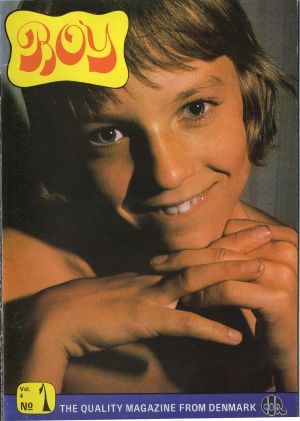
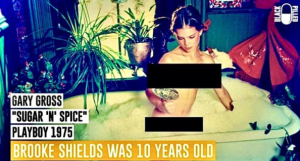
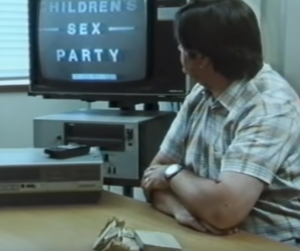
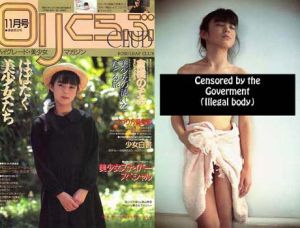
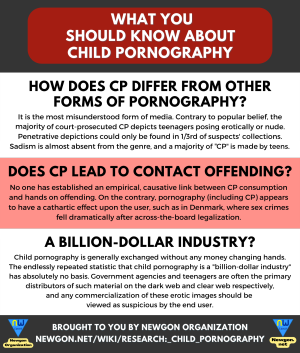

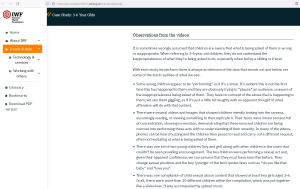
"Child Pornography" (CP) is a broad term which refers to nude, sexual, or pornographic depictions of children, minors, or persons under the age of consent, usually within the context of prohibition. The definition varies across jurisdictions, often with regard to moral and cultural sensibilities such as perceptions of nudity or appropriate ages for sexual activity. There are also a number of specific crimes related to child pornography; for example - "making" images (contrary to most people's perceptions, this is simply the act of saving an image) and "distributing" them. In many cases the laws pertaining to different CP crimes use different labels and the term "Child Pornography" itself remains a colloquial, catch-all term.
Etiology of the victimhood paradigm
Following its identification in the 1970s, "CP" has quickly risen to occupy a strange place in the popular psyche. Subsequent to ever-increasing regulations and penalties, the act of viewing and collecting imagery classified as CP is often seen as significantly worse than having sexual relations with a minor, with penalties in the US commonly approaching 10 years or more. This is thought to be not only because of the false belief that CP is an industry (outside of law enforcement), but because use of "CP" constitutes ponderous self-acknowledgement of forbidden temptations, rather than the mere inability to resist such temptations. Following media misinformation starting in the late 70s and 80s, to most Americans the mere mention of "Child Porn" conjures up false images of "pedophilia on steroids" and the violent rape of prepubescent children and infants on film.
In the 00s and early 10s, it was common for Western regulators, law enforcement agents and social theorists to claim that each instance of viewing "Child Pornography" was a separate act of abuse against the "child" featured in the material, regardless of whether or not the "child" was aware of this.[1][2] More recently, preventionists and prohibitionists such as Prostasia Foundation and Brave have recirculated this argument, even describing it as an "understatement".[3][4] The UK Government's Peter Kyle took the meme to a new level of absurdity when he claimed on TV that verifying your age "keeps a child safe".[5]
Those in favor of liberalizing CP statutes may point to the aforementioned "voodoo abuse"[6] trope as evidence that CP's prohibition relies upon an unchallenged "metaphysical" wrong, or "thought-crime". Sometimes also described as the "revictimization" narrative of CP, the argument is rarely applied to acts of "non-sexual" victimization (i.e. depictions of battered women in domestic abuse campaigns) or acts of state violence (i.e. depictions of chemical and nuclear warfare). While the producers are aware that many of those viewing domestic abuse campaigns will be inclined to such acts, and that chemical warfare is justifiable under some authoritarian ideologies, imagery of "non sexual" harm is permitted as it is implicitly assumed their dissemination is not only necessary for public education, but their wrongfulness is graphically obvious. Thus, regulators' fear with respect to CP, is that its harmfulness can not be detected by simply viewing the images, and indeed, that minors may appear to have enjoyed their abuse by giggling on camera or experiencing an orgasm.
Dissent in the judiciary
In some cases, American judges have felt the need to apologize for unnecessary and draconian "mandatory minimum" sentences against men who pose no risk to society.[7] Dissent against excessive sentences for CP remains widespread in the American judiciary,[8][9] and is an often-cited criticism of Ketanji Brown Jackson, Associate Justice of the Supreme Court of the United States.[10]
As recently as 1990, the US Supreme Court published a dissenting opinion (supported by Justices William Brennan, Thurgood Marshall and John Stevens) that defended the right of individuals to privately possess CP, on the grounds of constitutionality and freedom of thought.
Etymology
Etymologically speaking, the term "pornographos" referred to depictions of harlots (prostitutes) in Ancient Greece. Labelling child images as pornography (calling them whores, essentially) contradicts the thought process that children cannot consent to sex. Prostitutes must by definition be consensually selling sex, otherwise it is rape and not prostitution. People who are sold as objects without their consent are called sex slaves, not prostitutes.
Nature and history of "CP"
- See also Research: Child Pornography and Research: Double-Taboo CSA. For deeper history of obscenity as a legal concept see moral panic timeline.
In the 2020s, the Percy Foundation have noted "child pornography offenders are the most rapidly rising component of the federal carceral system, with whole facilities (including U.S. Penitentiary Tucson, FCI Seagoville, FCI Elkton, FCI Petersburg, FCI Marianna) now devoted to warehousing them".[11] Yet legal prohibition of child pornography in the United States and Western world only emerged in the late 70s as a consequence of emerging moral panics over child sexual abuse. In the United States, for example, the Protection of Children Against Sexual Exploitation Act of 1977 banned for-profit production and distribution of child pornography at the federal level.[12]
Some early legal battles over child pornography in the United States hinged on the concept of obscenity, a legal term used to denote pornography and other materials which can be prosecuted and regulated by the state. Paul Ferber, the owner of an adult bookstore in Manhattan, was prosecuted under a New York State obscenity law after selling an undercover policeman films depicting young boys masturbating. A state trial declared Ferber guilty of promoting indecent sexual performances but found that the films did not constitute obscenity. The conviction was unanimously overturned by The New York Court of Appeals, suggesting that child pornography that was not "obscene" was Constitutionally protected. However in the 1982 case New York v. Ferber the Supreme Court unanimously held that material depicting children engaged in sexual activity could be banned.[13]
In the late 80s and early 90s, a number of photography controversies[14] rocked the American Intelligentsia as Child Pornography laws continued to expand and target artwork. Cincinnati Contemporary Arts Center director Dennis Barrie was charged with violating obscenity laws for presenting "Robert Mapplethorpe: The Perfect Moment." He was acquitted by a jury. FBI and local police broke into San Francisco photographer Jock Sturges's home to investigate a photo-lab tip that Sturges was a child pornographer. Ten months after confiscating most of his possessions, and destroying some of his film stock and records, charges had still not been filed. Sally Mann is another example of a photographer who faced similar controversy in the 90s, and one case even involved a photograph of a man with an erection holding his infant son - defended as non-obscene.[15] According to one academic who interpreted these events as part of a "moral panic [... which] has swept the United States," "Witness for the prosecution Judith Reisman of the American Family Association has described these pictures, taken with permission of the children's parents, as "photographic assault and rape."[16] Lawrence A. Stanley summed up these events in an article republished by Newgon in 2023.
It was not until 1990, in the case Osborne v. Ohio, that the U.S. Supreme Court ruled that the mere possession of child pornography could be made illegal. In a 6-3 decision, the court held an interest in banning images used to "lure" or groom minors as among the reasons to prohibit the material. A dissenting opinion was written by progressive justice William Brennan; he was joined by liberals John Paul Stevens and Thurgood Marshall, the court's first black justice. Brennan's dissenting opinion argued, "When speech is eloquent and the ideas expressed lofty, it is easy to find restrictions on them invalid. But were the First Amendment limited to such discourse, our freedom would be sterile indeed. Mr. Osborne's pictures may be distasteful, but the Constitution guarantees both his right to possess them privately and his right to avoid punishment under an overbroad law."[17] More recently, constitutional arguments have been made testing the "gray area" between age of consent laws and "child" pornography, where the former is lower than 18.[18] Some have also argued that prohibitions against CP are inherently unconstitutional.
Most people would intuitively assume that "CP" investigations focus on the "worst kind" of material and pay less attention to "borderline" collections. This is not true, however, with well known cases such as LS Studio, Webe Web, Azov and the formerly legal material from the 70s featuring "teen nude or semi-nude modeling" type material with provocatively posed adolescents, who have provided positive testimony following their experiences. "Low hanging fruit" is therefore the bread and butter of law enforcement agents when it comes to prosecuting CP. Even some of the better-shared series of oral and penetrative sex described as "rape" would appear to have been made at the very least voluntarily. Compare for example, Wikipedia's account of the "Vicky Series" to the conflicting account[19] of Nathan Larson, an incel. The IWF of all institutions would appear to agree with the objective content of these observations, albeit couching them in loaded language.[20]
Another assumption is that CP is traded commercially in a "multi-billion dollar industry". Again, as our research articles detail, this is a long way from the truth,[21] and even the "worst" sentences are handed out to non-commercial traders.[22]
Self-made and "capped" material (mainly 2010>)
As mentioned in our research articles, most material in circulation nowadays is self-made (i.e. by teens themselves, with phones and webcams). In the IWF's 2022 report, even 70% of the prepubescent material was self-produced, and this number continues to rise.[20] It is a widely known "problem" that teens and sometimes even preteen minors[23] will not only produce their own "selfies" for sharing with one another, but strip and display of their own accord during livestreams on well-known sites such as Omegle and historically YouNow. Since these sites are very large and considered to be mainstream, a "safety in numbers" effect can be observed in which any illegal activity taking place goes under the radar.
Youth-led enterprises
In some cases, enterprising youths will actively seek to monetize their content, as was the case with the now defunct KidsChat.[24] Youth from the age of 12 have set up complex commercial networks selling their own pornographic imagery to multiple end users, and have faced prosecution for it.[25] Due to privacy concerns, and local differences in the way these supposed crimes are dealt with, very little is ever heard about these attempts.
Capping
That material which does circulate via the dark web is occasionally "capped" (saved video footage) from the above type of site, with boys being particularly willing to strip and perform when they are lured with video of stripping and masturbating girls and women. Cappers of teenagers are very secretive about sharing their material, often taking measures to prevent it leaving the dark web. When cappers of boys have been approached for comment, they tend to defend this practise as the only available method of producing material in the present environment, adding that it rarely if ever circulates on the clear web.
Post-2000 international prosecutions (with country of origin)
Belarus Studio (Belarus)
Belarus Studio, a child pornography production studio in Minsk, Belarus, was shut down in 2021 after a tip from US authorities via Interpol. The studio's photographer and five mothers of the girls involved were arrested. The studio had worked with 11 girls, aged 5 to 12, and had paid their mothers 200 to 5,000 rubles, while the girls received rewards such as 10 to 60 rubles, mobile phones, and gifts. The investigations found that the mothers had purchased items, including sex toys and underwear, for their daughters to use in the productions, reportedly motivated by financial gain.
Siberian Mouse (Russia)
Siberian Mouse, a Russian photography studio, operated from 2001 to 2011, producing child pornography with an international customer base. The studio's photographer, Sergei Kropochkin, was arrested in 2011 and later convicted of 145 counts of sexual crimes against girls. It is estimated that around 500 girls were involved in the operation, receiving payments of 200 to 10,000 rubles for their participation. The studio's activities were eventually shut down following a joint operation by Russian authorities and Interpol.
LS Studio (Ukraine)
LS Studio, a Ukrainian-based online subscription service and photography studio, operated from 2001 to 2004, producing and selling hundreds of thousands of images and videos featuring young girls. The studio created around 80 collections, attracting thousands of members worldwide, and generated several hundred thousand dollars in profit. Approximately 1,500 girls, aged 7 to 16, were recruited as models in Ukraine, and their photos were uploaded to servers in the United States and Canada. The studio's activities were shut down in August 2004, following an investigation by Interpol and Ukrainian authorities.
Webe Web (United States of America)
Webe Web Corporation, a Florida (USA) based child modelling company was raided in 2005 by the FBI and prosecuted under the allegation that they produced child pornography, although Webe Web never published a single video or picture of a naked underage girl and the Government itself admitted to "uncooperative witnesses" (see their video testimony[26]). Out of over half a million photographs of non-nude child modelling, the prosecutor only picked up a few dozen of them for the trial. Even after the Court was informed that the parents all were aware of the photoshoots and present when they took place, it was also learned that Webe Web made over a million dollars in profit, not surprisingly six former Webe Web models asked for restitution money, some up to $150,000, six other models declined, and three other child models and their parents did not even want to speak with Government agencies investigating the hypothetical "child abuse". In light of the situation and risking a 30 year prison sentence the defendants thought it wiser to plead guilty in exchange for a lighter sentence. Jeffrey Robert Libman was sentenced to 108 months (9 years) imprisonment followed by supervised release for the remainder of his natural life, Libman was also ordered to pay $1,600.00 in special assessments, and agreed to forfeit all criminal proceeds to pay restitution. Jeff Pierson was sentenced to 67 months (approximately 6 years) imprisonment to be followed by 10 years of supervised release. Marc Evan Greenberg was sentenced to 33 months (approximately 3 years) imprisonment followed by 3 years of supervised release. Greenberg agreed to forfeit all criminal proceeds to pay restitution.[27][28]
Azov Films (Canada and Eastern Europe)
- See also, BoyWiki's full list of articles detailing these events.
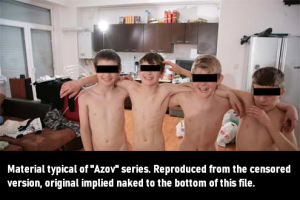
Azov Films, first known as MovieBizz and later renamed Baikal Films, was a company with business offices in Canada that operated for over ten years until May 2011. The company specialized in commercial coming of age and nudist films featuring young boys that were shot in Ukraine, Romania and Moldova. Azov nudist films showed naked preteen boys having fun at home, sauna or at the pool, with no sex involved. The company, 4PSP Inc., was first investigated by Canadian police in 2006, but nothing illegal was found.[29][30][31]
Toronto Police Service raided the company business offices 1st of May 2011 arresting the owner Brian Way, they seized business records containing customer purchases dating back many years and passed it on to governments around like the world including Australia, Spain, Norway, Mexico and the United States. Those countries started to arrest anybody who had bought the films and charged them with child porn. During a Toronto Police Service press conference, the word naturist was hardly mentioned by the spokeswoman, using the term "child sex abuse" instead. In order to describe images of nude boys, a few press articles mentioned, in a now cliché manner, that the films contained "horrific sexual abuse" and "some of the most horrific images ever seen". Yet, the affidavits of the arrests, quote law enforcement inspector testimonies claiming that the videos show "lascivious exhibition of genitals" and "sexually explicit conduct", also claiming that only 160 videos out of the over 600 that Azov Films sold have been classified as "child pornography". Law enforcement affidavits mention that detectives used customer's email addresses to subpoena email providers and ISPs to confirm that the email used to make the order matched credit card details, law enforcement also used computer IP, date and time the purchase order took place, all of this data was extracted from Azov Films servers and the manager's laptop.[32][33][34][35][36][37][38]
"Victim" testimony follows:

Cristi became a well-known draw on Azovfilms.com, receiving top billing and a steady following. "I have no anger" towards Roth, says Cristi, now 18. "It was not such a big deal as everyone made out."[39]
1990s European "Action Boy" type hardcore
As laws and restrictions tightened around the world, yet another genre emerged, and that was European gay "boy" porn. Distinct from the present "twink" genre, this material is exemplified by the work of Sebastian Bleisch covered by Karl Andersson's excerpts on our article on revisionism in the Gay Community.[40] The males featured would fall between the ages of roughly 14 and 21 - ID was said to be required by the producer to prove models were above the age of 16, but was often faked.
Formerly legal content, inc. hardcore (mainly 1970s)
- See also: List of MAP-related magazines.
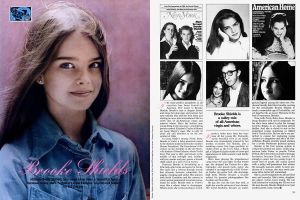
Color Climax, a well known Danish porn company still in business, was one of the few studios openly advertising in the seventies that they produced child pornography videos, as per Wikipedia. Its "Lolita" video series featured young girls with men, women, or other children, some of the titles produced by Colour Climax included "Incest Family", "Pre-Teen Sex", "Sucking Daddy" and "Child Love".
COQ International was another Danish company producing child pornography, they specialized in boys, one of their magazines, "Piccolo", contained a mix of hardcore and soft core child porn photographs, another magazine called "Boy", consisted of mere nudity, they also produced another magazine called "Uncle Joe". Other European productions were "Anna and her Father" and "Bambina Sex" (Danish). In the Netherlands a magazine with prepubescent girls called "Lolita" was published. Child porn magazines had very little text consisting of sexual caption on the photos, most pages were printed in black and white, but the frontpage was always in color. Up until recently, most of the hardcore youth erotica found on the Internet consisted of low-quality grainy photographs from scans of those magazines produced 40 years ago.
For a short time in the late 1970s Playboy Magazine published nude images of minor girls; French model Eva Ionesco appeared in the Italian edition of the magazine at age 11 in 1976 and again on the cover of the Spanish edition in 1978.[41] Playboy published nude photographs of a 10-year-old Brooke Shields in the United States in a 1976 publication entitled Sugar 'n' Spice.[42] Though courts have held that the images of Shields do not technically constitute pornography, they still demonstrate a brief period when the prevalence of pedohebephilic impulses among men was culturally acknowledged. In 2009, reproductions of the famous bathtub photograph featuring Shields were removed from the Tate Modern gallery in the UK. Lawyers advised they would not meet the definition of obscenity, required by UK law, however.[43]
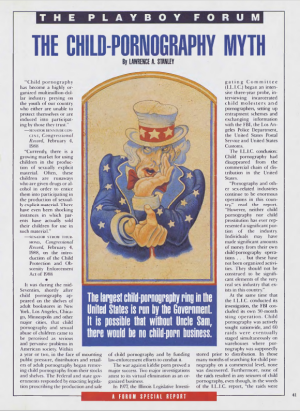
In a 2021 interview in The Guardian, Brooke Shields was asked if she felt harmed by her participation in sexually-oriented films and nude photo shoots as a young girl. She responded, "there's something incredibly seductive about youth... I think it just has different forms and it's how you survive it, and whether you choose to be victimized by it. It's not in my nature to be a victim."[44]
Politically-correct alternatives and their limitations
Most people who become politically engaged on the topic of "Child Pornography", or prohibited images of minors in general, prefer to use alternative terminology. There is presently no agreement on what form this should take.
"CSAM" (prohibitionist)
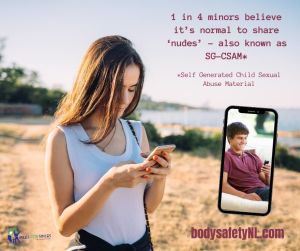
In light of well publicized "failures" of establishment figures to accept revisionist modern beliefs about CP,[45] a politically correct term, CSAM (Child Sexual Abuse Material) has come into use. CSAM, or CSEM (substituting "exploitation") is used particularly by eliminationists such as INHOPE, and has spread to media use. However, since most such material is now produced by minors, this term and the idea that all such material can be eliminated, is inherently problematic and has implications for civil liberties. Nevertheless, bodies such as the IWF, INHOPE and Nominet have put their weight behind the terminology "Self-Generated CSAM", albeit (but not always) within the context of extortion of younger minors.[46]
It should also be noted that most such minor pornographers are in fact teenagers and not prepubescent children, who feature in a tiny minority of such material despite being of greater importance to investigators. Some investigations would also appear to contest the idea that the rarer, adult produced "CSAM" meets widely accepted scientific definitions of "abuse". Instead, such material may only violate legal statutes passed many years after production.
The UK's Internet Watch Foundation uses "Child Sexual Abuse Imagery",[47] implying (as with the similar "CSAM") that self-capture of nudity and masturbation is a form of self "abuse" by a "child" unto him or herself (see prohibited images of children). David Finkelhor suggests a transition from CSAM/CSAI to "Image-based Sexual Exploitation and Abuse of Children", although admits it may not adequately describe material youth create themselves and then share deliberately.[48]
As early as 2008, international regulatory networks were already attempting to change the "official language", "to reflect the seriousness of the phenomenon and to emphasize that pornographic images of children are in fact records of a crime being committed".[49]
"PIM" (moderate)
In 2024, Brian Ribbon, a moderate MAP activist associated with what went on to be known as early NOMAP efforts introduced the terminology "PIM" (Prohibited Images of Minors) via Mu. This is intended to serve as a completely neutral and legalistic term, and had already seen some use within the UK legal system.[50]
"Youth Erotica" (libertarian)
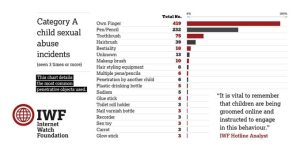
A more liberal term for the genre would be "Youth Erotica"[51] (or Child Erotica for prepubescent material), although libertarian terms have not seen widespread use due to the legal schemes in most western countries (see Child Pornography Laws, or Wikipedia's piece on the legality of CP).
The "child erotica" variant has seen some use in US law for reasons other than its accuracy. "Child Erotica" images of clothed children are deemed to be inappropriate if they arouse "lewd, prurient or sensual" desires, and have thus introduced a lower bar than CP laws.
Law enforcement as promoters
Much of the panic surrounding CP spans from the efforts of target-chasing law enforcement agents, who are known to confect nonexistent examples of CP (a typical method is labeling an entire collection "CP" if it contains but a few suspect titles) and even actively peddle it through the dark web.
Hyping non-existent "CP"
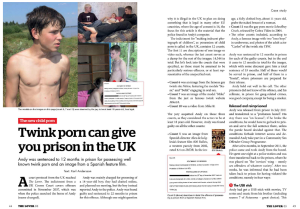
There have been many examples of mislabeling "child pornography" to create sensational "scoops" for the media.[53][54]
Martin
In 2021, California's Central Valley Internet Crimes Against Children Task Force claimed that M. Martin was found in posession of "more than 1,000 DVDs containing videos of children being raped" [our emphasis], adding "detectives consider this to be one of the largest collections of child pornography they have ever come across in an investigation".[55] In the first story, a photograph of what appears to be numerous rip-off DVDs and a small number of commercial (i.e. legal) titles was published. The reason for censoring the titles of those commercial DVDs was at the time unclear. Suspicions about the veracity of these claims were later confirmed after Martin's sentencing, when more detailed photographs[56] of the collection were published, revealing well-known commercial "twink" gay porn labels such as Eastboys and Sex Slaves of Sodom,[57] which even has its own IMDB page.[58] The reason for censoring the initial image was therefore likely to be the potential embarrassment caused to law enforcement upon identification of banal pornography. Despite Martin's lawyer confirming that the CP element of the collection related to a small removable hard drive, trafficking-conspiracy influencer An Open Secret went on to use the images of perfectly legal material to repeat the original claims in a Twitter thread that went on to be shared over 5,000 times.[59][60]
Hoose
In another absurd example, prosecutors argued that images depicted children, despite the fact that one of the alleged "children" was attending the same courtroom to demonstrate they were in fact an adult. Most of the material had been age-verified, but for years, prosecutors pursued this baseless accusation in order to service the routine misuse of the Tanner Scale as a diagnostic method in Child Porn prosecutions. Fully 4 years after the search warrant was executed, the court found Hoose not guilty.[61]
At no point during the 4 year time frame did anyone involved in the prosecution contact, investigate or shut down ALS Scans business properties. At no point during the 4 year time frame did Dr. Barron report the child abuse she had testified about to the proper authorities, as required under Massachusetts law.
It’s clear the prosecution had nothing to do with justice, truth or protecting children. Instead, the agenda was, in part, an extreme attempt to advance a fraud being perpetuated upon the courts; the use of “experts in age determinations” in general, and the use of “Tanner Staging” in particular to satisfy the government’s burden of proof on the element of minority in alleged child porn prosecutions.
Active distribution
Law enforcement departments are considered to be one of the primary distributors of "CP". Indeed, as early as 1990 at a southern California police seminar, the LAPD's R. P. "Toby" Tyler proudly announced as much. The government had shellacked the competition, he said; now law enforcement agencies were the sole reproducers and distributors of child pornography.[62]
In the famous, and more recent instance of "Childs Play", Australian police took over a million-user CP forum for 11 months in 2016-2017. During this period, the number of posts containing one or more CP images were said to have effectively trebled, from 4500 to over 12,000, many of which were posted by LEOs themselves.[63] The parent of one girl even went so far as to insist that the police officers who circulated images of her daughter should have paid her:
My daughter should not be used as a bait. If they are using her images, then she should be paid or compensated for their use. It is not right for the police to promote these images, says the mother.[63]
It was also found that other federal institutions such as the FBI had similarly taken control of other well-known resources in order to carry out sting operations and distribute malware.[64][65][66]
Targeting and prosecuting minors for sharing images of minors
Child Pornography laws now appear to be regularly used against the people they were devised to protect. The fact that today, exponentially more minors are prosecuted for illegal images than adults were prosecuted in the early days (when a minor industry in CP did indeed exist) appears to seriously undermine the idea these laws are dispassionate, and not ultimately moralistic in nature:
- In Canada, most incidents involving non-consensual sharing of images involve minor perpetrators.[67]
- In the Netherlands, 1/12 CP prosecutions involves a minor offender.[68]
- In the US (2010), 23% of CP offenders were under 21.[69]
- In the US (2009), 23% of people prosecuted for CP production were minors. Half were entirely consensual, not involving blackmail.[70]
Conservative legal commentators such as Andrew McCarthy, for example, have criticized the prosecution of young people:
I can’t tell you how much I hated these cases. [...] When the dust settled in computer-porn cases, it often turned out that the culprit was a kid who wasn’t much older than the children depicted in the porn.[71]
A threat to civil liberties?
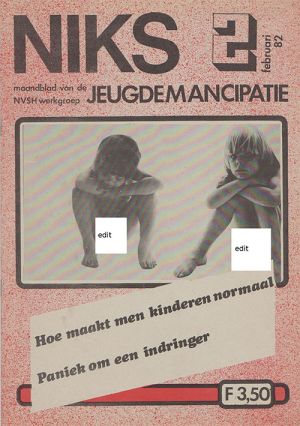
Corporations and governments have abused CP to increase surveillance and crack down on encryption. Apple, for example, once planned to search every image on their devices without the consent of the owners, only backing down after mass uproar.[72] In 2022, the UK government launched the No Place to Hide campaign, abusing figures and yet largely failing in an attempt to provoke public outrage against the use of encryption.[73][74][75]
American lawmakers have also attempted to use "CP" as an excuse push over-broad and unconstitutional laws against LGBTQ+ books in school libraries[76] and mainstream pornographic websites, especially those that allow user-generated content.[77] Such laws would usher in potentially limitless surveillance of porn consumption, using "any means deemed necessary" at the time, to verify users' age for entirely unscientific reasons. At the same time, websites with exponentially larger CP "problems" such as Twitter,[78] Facebook/Meta and other mainstream social media[79][80] would be virtually untouched. In one early-20s example, a political organization (NCOSE) campaigning for such reforms could only find 14 such examples of (suspected) CP on the "adult" websites it was targeting, despite the total number of reports running to 29.3 million throughout all media.[80] In another example of extreme lawmaking, the Australian government introduced regulations that could easily be interpreted as banning images of adult women with small breasts.[81] Since these laws were introduced, they have been repeatedly criticized by civil libertarians and those who believe they promote unrealistic and sexist beauty standards.[82][83]
Liberalization attempts
Criminalization of CP/Youth Erotica took place mainly in the post-70s era, sometimes gradually. Subsequent attempts at liberalization have been few and far between.
Hungary
In 2007, a bill modifying Hungary's penal code was proposed, which would legalize the production and posession of erotica involving 14 to 17-year-olds. The Justice Ministry said the draft proposal, presented by Hungarian Justice Minister Jozsef Petretei, was in line with European Union norms which give members states the right to regulate the issue at national level.[84]
Swedish Pirate Party
The party's founder, Rick Falkvinge has written in support of removing Child Pornography laws from a rational consequentialist/pro freedom-of-information perspective. In two essays from 2012, he elaborates his position.[85]
See also
- For a comprehensive list of articles, see Category:Child_Pornography.
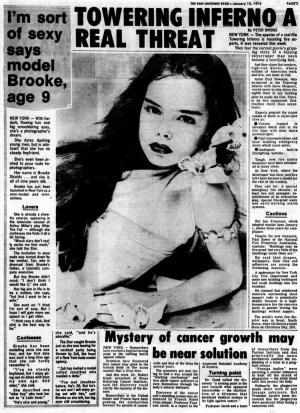
To avoid confusion of this topic, we constructed a series of articles that relate to this issue:
- Child Pornography Laws - Links to present laws.
- Indecent images of children - UK Laws.
- Research: Child Pornography
- Child Pornography (Wikipedia) - Archive of an old Wikipedia article (Censored article, as of 2008).
- List of MAP-related magazines - Some reference to nudist/erotica titles and banned mail-order video services.
In addition to this, all of the following may or may not be considered child porn:
- Boy Photography
- Girl Photography
- Non-photographic erotica involving minors, including literature and cartoons.
External links
Our research article on CP also contains numerous articles on this topic, including official manipulation of statistics.
- BoyWiki article - Some further research and perspectives.
- Child Pornography and Pedophillia. Report Made by the Permanent Subcommittee on Investigations of the Committee on Governmental Affairs - Gov report from 1986 that (for critical readers) provides a decent background to pedophile demonology and the intensification of CP discourse around that time.
- Omegle - One mainstream video chat site said to be a hub of Youth Erotica.[86]
- Hyping up the numbers - Examples of how statistics are manipulated.
- The Child Pornography Myth - A thorough article from 1989 (in the wake of CP hysteria). Lawrence A. Stanley.
- Child Porn Crusade - A legal/sociological perspective.
- The Cook Report, 1987. Cook confronts "child-pornographers" - Roger Cook investigates the low-level production of CP, at the end of the 80s, when the crackdown was beginning.
- Commentary on the EU-Directive on child pornography. by European Federation for Sexology (EFS). Issued by the executive committee on February 2011.
- "In criminalising all depictions of sexuality if the person is under 18, the Directive erases sexuality in children and young people. The proposed directive creates a legislative grey zone, where it is very difficult to know what is legal and what is not. From an ethical point of view there is nothing wrong with erotic drawings or art, where there is no harm done to any person. The problematic part is that people may be abused and harmed to in the production of pornographic depictions."
- Adolescents & young adults are not children. Declaration by German speaking sexological associations on the pending EU-Childpornography-Directive (13 February 2011) (web.archive)
References

- ↑ Wortley, Richard; Stephen Smallbone. "Child Pornography on the Internet". Problem-Oriented Guides for Police. No. 41: 17. "The children portrayed in child pornography are first victimized when their abuse is perpetrated and recorded. They are further victimized each time that record is accessed."
- ↑ Sheldon, Kerry; Dennis Howitt (2007). Sex Offenders and the Internet. John Wiley and Sons. p. 9. ISBN 978-0-470-02800-1. "... supplying the material to meet this demand results in the further abuse of children Pictures, films and videos function as a permanent record of the original sexual abuse. Consequently, memories of the trauma and abuse are maintained as long as the record exists."
- ↑ Prostasia Foundation on Harms of "CSAM"
- ↑ Bob Shilling circulates CP myths
- ↑ UK's Peter Kyle talking on a TV station
- ↑ Human Stupidity: Voodoo Abuse
- ↑ Judge Weinstein: NY Times
- ↑ Gayle Rubin - see towards end of video
- ↑ Survey of federal judges (U.S. Sentencing Commission in 2010) revealed 70% of the judges thought the mandatory minimums in cases of child pornography possession were too high.
- ↑ Sen. Hawley questions Judge Jackson’s discretion, judgment
- ↑ W. A. Percy Foundation on KBJ appointment and its relevance to CP
- ↑ Wikipedia - Child Pornography
- ↑ Wikipedia - New York v. Ferber
- ↑ Nude Art Controversies blog
- ↑ "Father and Son" case
- ↑ Laura U. Marks, Minor Infractions: Child Pornography and the Legislation of Morality. Afterimage (1 November, 1990); 18:(4), pp. 12–14.
- ↑ Wikipedia - Osborne v. Ohio
- ↑ Age of Consent and Child Porn Debated at 8th Circuit
- ↑ Vicky series
- ↑ 20.0 20.1 2021 IWF Annual Report: Case Study, backup, and 2022 version
- ↑ MARGARET A. HEALY, ECPAT, CHILD PORNOGRAPHY: AN INTERNATIONAL PERSPECTIVE (2004)
- ↑ Allen Man Caught With 58 Terabytes Of Child Porn Sentenced To 35 Years
- ↑ Children as young as 8 are voluntarily sharing nude photos: police
- ↑ KidsChat archive
- ↑ Malaysia police disband group involving 12-year-old girl and 4 friends who sell their explicit photos online
- ↑ Webe Web video testimony example 1 - backup, example 2 - backup
- ↑ LiGiHeaven: Webe Web
- ↑ Wikipedia: Webe Web
- ↑ Child porn bust: Anatomy of an international child pornography investigation
- ↑ BoyChat Thread
- ↑ 348 people arrested in child-porn case connected to Canadian firm
- ↑ Richard Keller Affidavit
- ↑ Gerard Silva Affidavit
- ↑ Gerald Denault Affidavit
- ↑ Phillip Woolery Criminal Complaint
- ↑ Nicholas Sysock Criminal Complaint
- ↑ Josh Ensley Criminal Complaint
- ↑ Ryan Bieler Criminal Complaint
- ↑ Child porn bust: How one man seduced an entire village
- ↑ Full copy, including extended analysis of the Sebastian Bleisch legal controversy can be found at Boylove Library (content and its legality may vary according to jurisdiction)
- ↑ Eva Ionesco’s “Playboy” Magazine Photos: Their Youngest and Most Controversial Model
- ↑ Was Brooke Shields Photographed for ‘Playboy’ at Age 10?
- ↑ TIME on Tate Modern controversy
- ↑ Resurfaced 1978 Article Sexualizing Brooke Shields, 12, Sparks Outrage
- ↑ Pope sparks moral outrage over his CP comments
- ↑ See for example End Violence, Nominet and INHOPE's treatment in which they place more emphasis on extortion.
- ↑ IWF 2021 Annual Report
- ↑ Finkelhor (2023). Child sexual abuse images and youth produced images: The varieties of Image-based Sexual Exploitation and Abuse of Children
- ↑ The 2008, the World Congress III against the Sexual Exploitation of Children and Adolescents stated in their formally adopted pact that: "Increasingly the term 'child abuse images' is being used to refer to the sexual exploitation of children and adolescents in pornography. This is to reflect the seriousness of the phenomenon and to emphasize that pornographic images of children are in fact records of a crime being committed." -
- ↑ See, e.g. [1], [2], [3], [4]
- ↑ After The Fall: Mentioned Youth Erotica within this context in 2015
- ↑ Robin Jackson's UK "order violation" which involved accessing legal-age porn
- ↑ Fantino: Example of nonexistent CP in Xtra
- ↑ Trewthe - Blog documenting some questionable prosecutions
- ↑ Central California Man Arrested In Case Of Huge Child Porn Cache
- ↑ Less than a year in jail for Fresno man who had child pornography videos
- ↑ Central Valley - More detailed photos (Archive)
- ↑ Sex Slaves of Sodom - IMDB
- ↑ An Open Secret Twitter thread (before amassing 5000+ shares)
- ↑ More on the sentencing, clarification
- ↑ Alleged Child Porn Victims Identified—As Adults. Prosecutor Ignores Evidence, Insists They Are Pre-Teens, And Proceeds With Prosecution
- ↑ Seminar at University of Southern California, according to James Kincaid.
- ↑ 63.0 63.1 VG - Investigation into a CP Investigation
- ↑ EFF - Playpen case
- ↑ Vice - Playpen case
- ↑ Guardian: Police take over CP site
- ↑ Non-consensual distribution of intimate images, an offence predominantly involving youth aged 12 to 17 Online child sexual exploitation and abuse in Canada: A statistical profile of police-reported incidents and court charges, 2014 to 2020
- ↑ Leukfeldt, E. R., Jansen, J., & Stol, W. P. (2013). Child pornography, the Internet and juvenile suspects. Journal of Social Welfare and Family Law, 36(1), 3–13. doi:10.1080/09649069.2013.851178
- ↑ USSC.gov: Sourcebook
- ↑ Trends in Arrests for Child Pornography Production: The Third National Juvenile Online Victimization Study (NJOV‐3)
- ↑ National Review: Senator Hawley’s Disingenuous Attack against Judge Jackson’s Record on Child Pornography
- ↑ Prostasia on Apple
- ↑ Rolling Stone - UK No Place To Hide campaign
- ↑ The @ukhomeoffice-funded #NoPlaceToHide campaign claims that “14 million reports” of child abuse may be “lost” if @Messenger implements #endtoendencryption. Here’s a horrible thought … (By Dropsafe)
- ↑ Why we need #EndToEndEncryption and why it’s essential for our safety, our children’s safety, and for everyone’s future #noplacetohide (By Dropsafe)
- ↑ LGBTQ Nation: Proposed library ban on LGBTQ Books
- ↑ PROTECT Act - Overbroad
- ↑ NBC News: Twitter under Elon Musk is still a hive of CP
- ↑ NCMEC CyberTipLine Data 2022
- ↑ 80.0 80.1 YNOT: NCOSE/Facebook
- ↑ Inquisitr: Australian Government Censor Confirms Small Breast Ban…Sort Of
- ↑ The Week: Australia's 'small breast' ban
- ↑ Women with Small Breasts Face Discrimination in Australian Pornography
- ↑ USA Today: Hungary may legalize porn involving 14- to 17-year-olds for home use
- ↑ Three Reasons Possession Of Child Porn Must Be Re-Legalized In The Coming Decade, and Child Porn Laws Aren’t As Bad As You Think. They’re Much, Much Worse
- ↑ Omegle: Children expose themselves on video chat site
- Child Pornography
- Official Encyclopedia
- Law/Crime
- Law/Crime: Crime Types
- Censorship
- Prostitution
- Hysteria
- Youth
- TV & Media
- Terminology
- Terminology: MAP
- Terminology: Popular
- History & Events: British
- History & Events: American
- History & Events: International
- History & Events: 1970s
- History & Events: 1980s
- History & Events: 1990s
- History & Events: 2000s
- History & Events: 2010s
- History & Events: 2020s